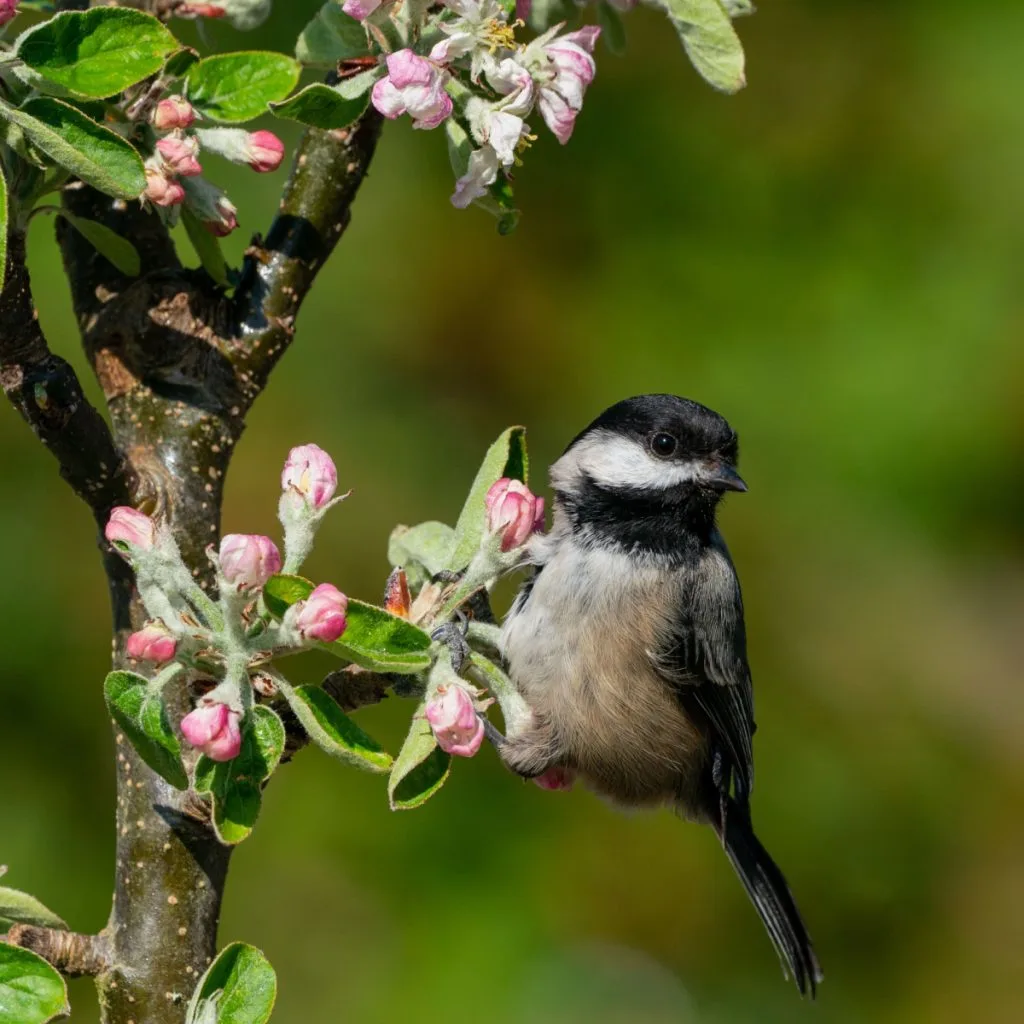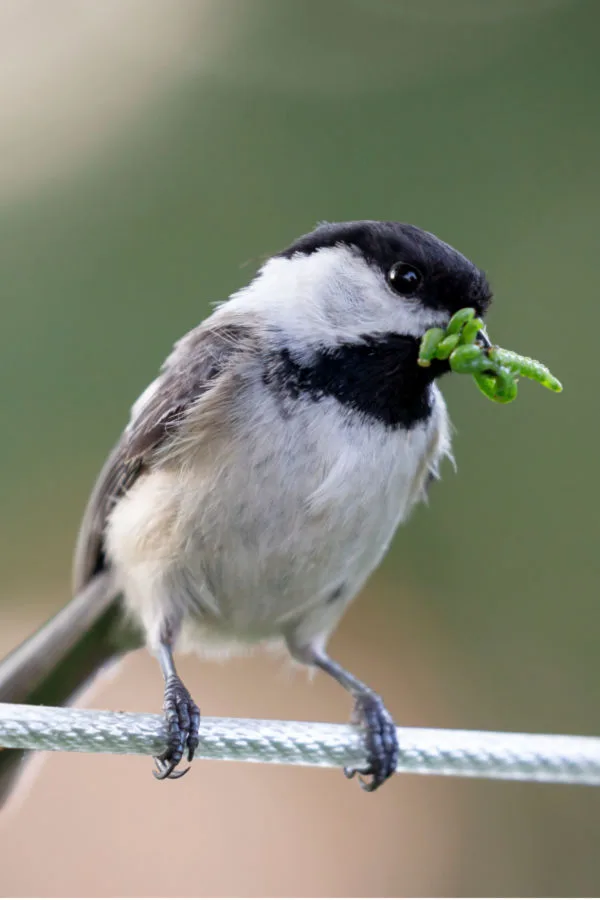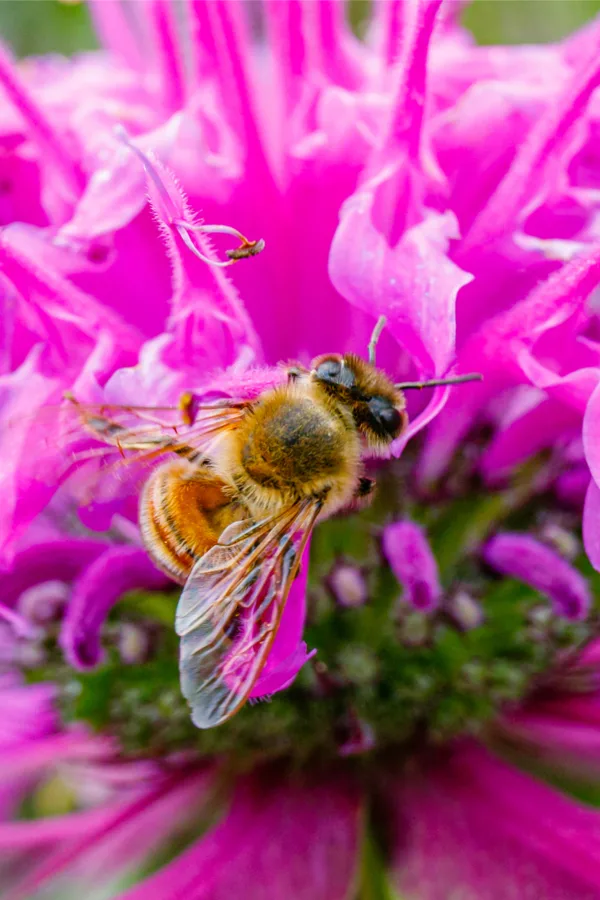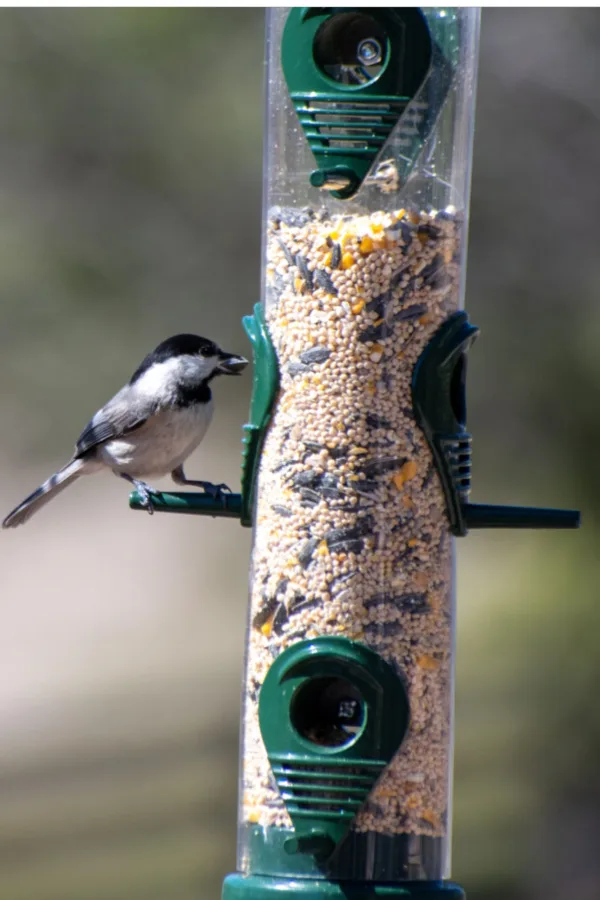Did you know that one of the best ways to help defend your garden from a long list of insects and pests that attack your plants is by simply attracting chickadees to hang out in it?
Not only are chickadees one of the friendliest and most social of all backyard bird species, they also happen to be one of the most vocal – filling the air with a wondrously happy chirp as they fly about. In fact, they are so friendly, that many gardeners tame them enough to land right on their hands for food!
But beyond all of their friendliness and cuteness, what really makes chickadees valuable is their ability to keep insect populations under control. Insects that love to feast on everything from vegetable plants and fruit and nut trees, to all kinds of perennial and annual flowers.

How Chickadees Help Gardens
The chickadee might be small in stature, but it has an incredibly big appetite. It’s appetite is so big that it routinely consumes over 30% of its body weight each and every day. But it can help your garden in even more ways than just eating insects.
Not only do chickadees consume insects that can be serious pests to plants such as caterpillars, aphids, moths, beetles and ants, they also love to feast on a wide variety of weed seeds too. That, of course, can play a big role in keeping weeds out of your gardens and flowerbeds right from the start.
Perhaps best of all, chickadees are not fond of migrating. That means that once you attract them, they can remain in your garden and yard throughout their life. With all of those benefits, it’s easy to see why attracting them to your garden is such a win-win!
The Secret To Getting Chickadees To Help Your Garden
Getting chickadees to come calling is actually a relatively easy task. To have them visit and stay – it all comes down to providing them adequate sources of food, water and shelter. When doing this, however, you need to think of what they will need in all four seasons, not just the spring, summer and fall.
Like nearly all living creatures, the most important attraction of all for chickadees is food. And the more of their favorite food sources you can provide, the likelier they will be to stay.

Number one on the list of what chickadees love are plants. Why? Because the more plant life you have growing, the more likely there will be insects and seeds for the chickadees to consume. And the plants chickadees love most are ones that have flowers with seed heads.
Four of the best perennials of all to plant for this are Black-eyed Susan, Coneflower, Blanketflower and Bee Balm. All have attractive blooms and produce large seed heads that chickadees love. All of these happen to attract pollinators, which also help your garden and flowerbeds as well.
Chickadees also love having shelter trees nearby. Oak, birch, maple and other hardwood trees all provide excellent shelter for the birds. As do pine trees. But even more, these trees are often home to caterpillars and insects, providing even more food for the chickadees.
Feeding Chickadees
In addition to providing chickadees with the plants they love for food and insects, supplementing their food supply with bird feeders is one of the easiest and best methods for attracting chickadees and getting them to take up permanent residence.
This can be especially true when feeding them through the winter – when insects and seeds may not be readily available. The key here to success is keeping the feeders filled regularly. See our article: How To Help Chickadees Survive Winter – The Best Way To Feed Chickadees.

In the spring and summer, start by installing a feeder that is easy for them to use and visit. Chickadees are small birds and aren’t high up in the food chain. Because of this, they need a bird feeder to keep them safe from predators. One of the best choices for chickadees is a metal cage tube bird feeder.
The metal cage gives chickadees plenty of space to get in and out while feeding, but keeps the larger birds and animals at bay. It’s best if your cage feeder has multiple feeding ports and can handle weather elements. Affiliate Link: Caged Bird Feeder, Large – Squirrel-Proof.
The Seeds & Feed Chickadees Love
So now that you know which feeders work best, what is the best food to use to attract chickadees in order to get them to help your garden?
Chickadees stick for the most part to a healthy diet. Because of that, sunflower seeds are high on the list of the healthy nuts they enjoy. So much so that even the type of sunflower seeds does not matter. Making such seeds available through feeders in your garden will attract chickadees, titmice, woodpeckers, finches, and many other small birds as well.
Peanuts are another great choice. They have protein and fat in ample amounts. Both of these nutrients are especially necessary for chickadees during the winter months. When feeding chickadees peanuts, always feed with shelled peanuts. It can be difficult for them to break the hard outer shell because of their small beaks.

Nyjer seeds are also a great feed for chickadees and many other birds. You can also mix nyjer with sunflower seeds and peanuts for a chickadee feast. Affiliate Link: Nyjer/Thistle Seeds Wild Bird Food
Last but not least, safflower seeds are a regular staple of chickadees. However, there is a difference between safflower seeds and other seeds. Most other birds will ignore safflower seeds. So, if you only want to attract chickadees, they are an excellent choice for bringing them in!
How Water & Nesting Boxes Help Attract Chickadees To Your Garden
As with attracting all birds, a water source is important for hydration for chickadees. Chickadees will source water quite easily from anywhere. They are more than happy to visit bird baths and small outdoor ponds.
If you have neither, consider placing a few dog bowls of water under trees and out of the way. As with any stagnant outdoor water source, always be sure to empty and refill bowls regularly to keep the water both clean and free of mosquito larvae.

In the spring, chickadees are cavity nesters. They will occupy any cavity left empty by other birds. However, they modify these cavities by collecting moss and animal fur to soften the spot for eggs.
To mimic this for chickadees, you can install a nesting box. These are great for not only chickadees, but wrens and other small birds. When installing a nest box, do not put a perch on the box as it can make it easy for predators to get to them. Affiliate Link: Stokes Select Wren & Chickadee Nesting Bird House, Natural Wood
Chickadees also love to use unoccupied nest boxes during the winter. An unoccupied bird house provides a much-needed warm winter place and an easy entry point. It also helps insulate them from the winter winds and cold.
Here is to attracting all kinds of chickadees to your garden this year – and getting them to help you keep your plants safe from attack!
This Is My Garden
Follow Our Facebook Page For Great Gardening Tips And Advice! This Is My Garden Facebook Page
This Is My Garden is a garden website created by gardeners, for gardeners. Jim and Mary Competti have been writing gardening, DIY and recipe articles and books and speaking for over 15 years from their 46 acre Ohio farm. They publish three articles every week, 52 weeks a year. Sign up today to follow via email, or follow along!
